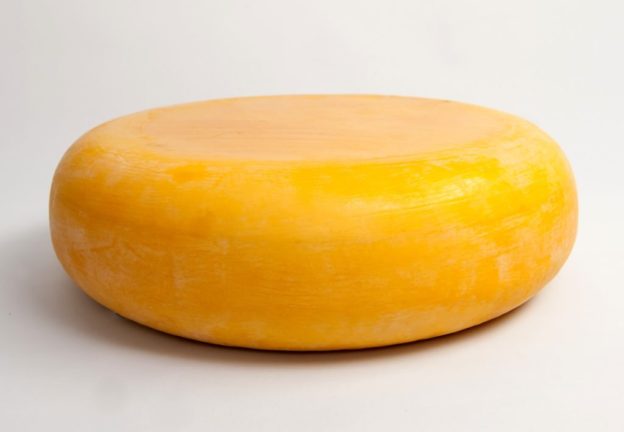Aged Gouda
The Basics
| Make | Hard |
| Sub Make | Cheeses which acidify in the mould |
| Post-Make | Wrapped, Rolled or Processed |
| Sub Post-Make | Artificial (plastic coating, wax coat, matured in vacuum pack) |
| Typical age profile | Typically over 12 months |
| Approximate weight(s) | Typically 5-10kg |
| Geographical origin | Traditionally the Netherlands, but the name 'Gouda' is not protected so is made in many countries throughout the world |
| Protected status | Boerenkaas TSG - made with raw milk on the farm in the Netherlands. Gouda Holland PGI - cow's milk , made and matured in the Netherlands. Noorde-Hollandse Gouda PDO - milk obtained from the Noord Hollandse province |
| Species of milking animal | Cow |
| Raw/pasteurised milk | Examples of both depending on cheesemaker |
| Vegetarian/animal rennet | Examples of both depending on cheesemaker |
| Commonly encountered variations | Cumin seeds and other herbs and spices are often added to Gouda |


The Story
Widely adored for its sweet flavour, Gouda is named after the Dutch town where it was traded. Large rounds of the cheese are still brought into Gouda’s cobbled square in the summer by handcart, where farmers and merchants haggle by slapping hands before sealing the deal with a handshake.
Gouda is a washed curd cheese, which involves removing some of the whey from a vat (after the curds have been set, cut and stirred) and replacing it with hot water. This removes lactose so the bacteria have less to feed on and produces less acidity, resulting in sweet caramel notes in the final cheese. The hot water also scalds the curds by raising the temperature to 36°C, causing more whey to be released. The cheeses are pressed, brined and often waxed or plastic-coated.
The Character
Young Gouda has a smooth pliable texture and sweet, fruity flavour, but after 12 months the aged cheeses become hard and brittle with typically fruity, spicy and dairy notes. Aged Gouda should have a closed texture, with or without small eyes. Splits or jagged, uneven openings should not be present. Crunchy crystals are also often present in older cheeses.
Perfect Partners
The sweet, cocoa notes of stouts and porters work well or try a robust, fruity red such as Barolo.
















